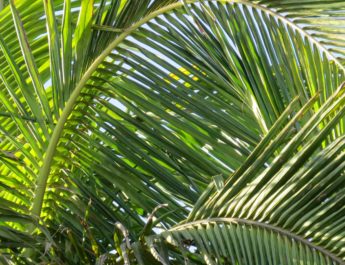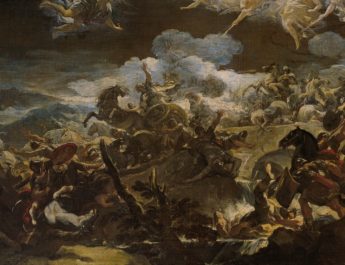Isaiah 9:1-4
Third Sunday after Epiphany A
1 But there will be no gloomA for those who were in anguish.B In the formerC timeD he brought into contemptE
A “gloom” = muaph. 1x in OT. From uph (to fly, flee, shine, be weary, be faint). This is gloom, covered, dark, distress.
B “anguish” = mutsaq. 3x in OT – 2x in Job & 1x in Isaiah. From tsuq (to press on, compress; figuratively, to oppress or bring distress) OR from yatsaq (to pour out, flow, wash away, or overflow; can imply melting as one does to cast metal; by extension, something being steadfast, stiffened, firmly in place). This is constraint, narrowness, or distress.
C “former” = rishon. From rishah (beginning or early time); from rosh (head, captain, or chief; excellent or the forefront; first in position or in statue or in time). This is first, former, ancestor, beginning, ranked first.
D “time” = eth. Probably from anah (to answer, sing, announce); from ad (forever, all, old); from adah (to pass on, advance, decorate oneself). This is a period or season. It can also mean whenever or continually.
E “brought into contempt” = qalal. This is to be little, insignificant, swift. It can also mean to bring down in esteem, create contempt, curse
the landF of ZebulunG and the land of Naphtali,H but in the latterI time he will make gloriousJ the wayK of the sea,L
F “land” = erets. Root may mean to be firm. This is earth, ground, field land, or country.
G “Zebulun” = Zebulun. From zabal (to dwell, inclose, reside). This is Zebulun, that tribe, or their territory. It means “habitation.”
H “Naphtali” = Naphtali. From pathal (to twist, twine, wrestle, struggle, behave in an unsavory way). This is Naphtali, meaning “my wrestling.” It can refer to Naphtali, his tribe, or the lands of the tribe.
I “latter” = acharon. From achar (to be behind, delay, be late, procrastinate, continue). This is end, last, coming behind, to loiter, later. It can also refer to the west.
J “make glorious” = kabad. To be heavy, weighty, or severe. It can also be positive abounding in, rich, or honorable. The Hebrew word for “glory,” kabod, is taken from this root.
K “way” = derek. From darak (to tread, march, to walk. Can also mean affixing a string to a box since one needs to step on it to bend it in the process; so also an archer). This is a road as a thing that is walked on. Can be used figuratively for the path that one’s life takes or how one chooses to live one’s life.
L “sea” = yam. Root may mean to roar. This is the sea, often referring to the Mediterranean. It comes from the root in the sense of the roar of crashing surf. This word is sometimes used for rivers or other sources of water. It can mean to the west or to the south.
the land beyondM the Jordan,N GalileeO of the nations.P
M “beyond” = eber. From abar (to pass over, pass through, or pass by; cross over or to alienate; used for transitions). This is the place across or beyond, by, from, other, the opposite side, against, over. It often refers to the other side of the Jordan river or toward the east.
N “Jordan” = Yarden. From yarad (to go down, descend; going down in a literal or figurative sense; going to the shore or a boundary, bringing down an enemy). This is the Jordan River, meaning “descending.”
O “Galilee” = Galil. 6x in OT. From galal (to roll in a literal or figurative sense, roll away, roll down, wallow, remove, trust). This is a circle, district, or ring. It is also Galilee.
P “nations” = goy. From the same root as gevah (the back, person, or body); related to gev (among); related to gaah (to rise up). This is nation or people. Often used to refer to Gentiles or foreign nations. It can also be used figuratively for a group of animals. This is where the Yiddish “goy” comes from.
2 The peopleQ who walkedR in darknessS
Q “people” = am. From amam (to darken, hide, associate; creating shadows by huddling together). This is people or nation. It can be used specifically for a tribe, collectively of troops or armies, or figuratively to refer to a flock of animals.
R “walked” = halak. This is go, come, walk. It is walk literally and figuratively and includes people and animals. It can be used figuratively for one’s moral life – how we walk according to God’s way or against it. It can also refer to the walk of life as in the course one’s life takes, the choices we make, etc.
S “darkness” = choshek. From chashak (to be or become dark). This is literal darkness is contrast to light. Figuratively, it can be obscurity, sorrow, misery, blindness, wickedness, destruction, death. It can also be hiding places. Additionally, it can mean judgment, mourning, ignorance, evil, or sin.
T “seen” = raah. This is to see in a literal or figurative sense so stare, advise, think, view.
U “great” = gadol. From gadal (to grow up, become great, become wealthy – to advance. The root meaning may be to twist in the sense of the process of growing). This is great, high, bigger, noble, old, marvelous. It can also refer to someone who is powerful or distinguished.
V “light” = or. From or (to be or become light). This is light, sun, sunshine, dawn, or daylight. Figuratively, it can refer to light from instruction, light of a face (that is to say one that is cheerful or finds favor). It can refer to prosperity or salvation; a light that guides, a light eternal from Zion.
those who livedW in a land of deep darknessX—
on them light has shined.Y
W “lived” = yashab. This is to sit and so to remain and so to dwell. It is sitting for any reason – as a judge, in order to ambush, or just sitting quietly. Causatively, this can mean settling or marrying. This can also mean continue, endure, or establish.
X “deep darkness” = tsalmavet. 18x in OT. From tsel (shade in a literal or figurative sense; shadow, shade, protection, shelter, or defense); {from tsalal (to be or become dark, shade; this is the shade as during twilight or shadow as associated with something opaque)} + mavet (death, deadliness, the dead, or the place where the dead go; figuratively, pestilence or ruin); {from mut (to die in a literal or figurative sense)}. This is a deep shadow, the grave. Figuratively it is a darkness like death or a calamity. This is the “shadow of death” from Psalm 23:4.
Y “shined” = nagah. 6x in OT. This is to shine, enlighten, or glitter.
3 You have multipliedZ the nation,
you have increasedAA its joy;BB
they rejoiceCC beforeDD you
as with joy at the harvest,EE
Z “multiplied” = rabah. This is increasing in any aspect whether quantity, authority, size, quality, greatness, etc.
AA “increased” = gadal. Related to “great” in v2. See note U above.
BB “joy” = simchah. From samach (to rejoice, be glad; properly, to brighten up; also used figuratively). This is joy, rejoicing, pleasure, or glee.
CC “rejoice” = samach. Related to “joy” in v3. See note BB above.
DD “before” = paneh. Literally, “before your face.” From panah (to turn, face, appear). This is face in a literal or figurative sense. It could be face, presence, anger, respect. It can also be used of God to indicate divine favor or presence.
EE “harvest” = qatsiyr. From qatsar (to cut down, be short, reap, curtail; used especially for harvesting grass or grain; figuratively, to be discouraged or grieve). This is branch, harvest, one who harvests. Properly, this means severed, reaped. It is the crop being harvested, the time of harvest or the one who harvests. It can also be a bough.
as people exultFF when dividingGG plunder.HH
FF “exult” = gil. Properly, this is twirling around because of a strong feeling whether of rejoicing or from fear. This can be rejoice, be glad or joyful, or to cry.
GG “dividing” = chalaq. This is to be smooth in a figurative sense. So, it can refer to the stones that were part of casting lots – hence, apportion, share, distribute. Figuratively, it can also mean to flatter.
HH “plunder” = shalal. From shalal (to plunder, loot, capture). This is spoil, prey, or plunder.
4 For the yokeII of their burden,JJ
and the barKK across their shoulders,LL
II “yoke” = ol. From alal (to insert). This is a yoke that is borne on the neck, whether a literal yoke or used of a figurative one.
JJ “burden” = sobel. 3x in OT. From sabal (to carry a heavy load, do strong labor, be a burden; specially, to be pregnant). This is a load or burden in a literal or figurative sense..
KK “bar” = matteh. From natah (to stretch or spread out, extend, bend). This is a staff, rod, branch, or tribe. It could be a rod for discipline or correction. It could be a scepter to indicate authority, a throwing lance, or a walking staff. Figuratively, it could also be something that supports life (like bread).
LL “shoulders” = shekem. Perhaps from shakam (to rise early, begin work early; properly, this is leaning one’s shoulder or back into a load or a burden; also, loading an animal for work). This is shoulder, neck, or some other place that bears burdens. Figuratively, it can refer to the spur of a hill, or one’s allotted portion.
the rodMM of their oppressor,NN
you have brokenOO as on the dayPP of Midian.QQ
MM “rod” = shebet. This is a rod, staff, club, scepter, dart, or tribe. Literally a stick that can be used for punishing, writing, fighting, walking, ruling; thus, used figuratively for a clan.
NN “oppressor” = nagas. This is driving an animal, worker, debtor, or an army. By implication, it can mean to tax, harass, distress, oppress, or tyrannize. This word can be used for taskmaster or overseer.
OO “broken” = chathath. This is properly to prostrate. So it could be shatter, break, or break down in a literal, violent sense. It could also figuratively refer to being dismayed, discouraged, or frightened. It can also mean to stand in awe.
PP “day” = yom. Root may mean being hot. This is the day in a literal or figurative sense. It can also mean birth, age, daylight, continually or other references to time.
QQ “Midian” = Midyan. From the same as madon (strife, contention, brawling); from din (to judge, defend, dispute, govern, strive). This is Midian or a Midianite. It means strife or place of judgment.
Image credit: “Descending into Harwood’s Hole” in Takaka Hill, New Zealand – photo by Paul Rowe, 2013.




